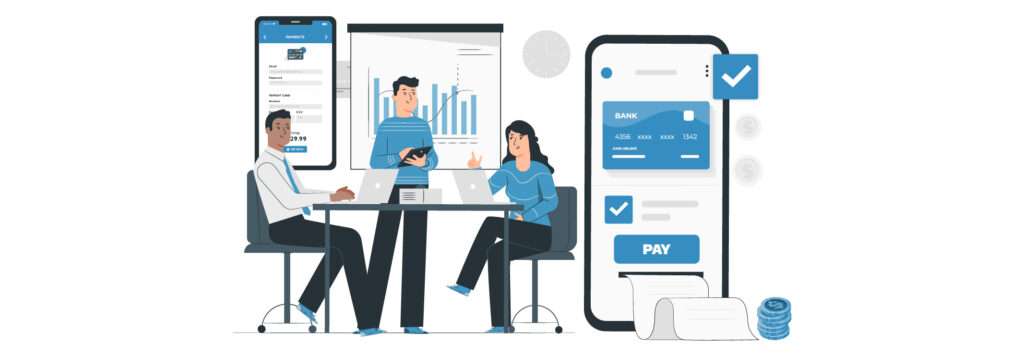The business world is rife with competition and in order to improve their services and establish a strong brand positioning, both small and large players are continuously improving their processes. Managing finances usually becomes a tricky territory, which is why every month firms are presented with a challenge to either retain in-house accounts payable teams or opt for accounts payable outsourcing to focus on strategic initiatives and scale better.
But, can every business benefit from accounts payable outsourcing?
With global spending on outsourcing hitting a whopping 731 billion USD in 2023, companies are reconsidering their hiring decisions. Therefore, if you are thinking about taking an informed call on accounts payable outsourcing; you are at the right place. Let’s examine.
What Is Accounts Payable Outsourcing?

Accounts payable outsourcing involves hiring vendors to manage particular AP tasks such as processing and paying invoices. This is usually done to reduce the financial workload on your in-house team. Typically, accounts payable outsourcing providers often integrate new capabilities to manage existing accounts to offer a streamlined environment.
However, outsourcing AP is not for the faint-hearted. Some businesses may find it difficult to hand over their precious data to third parties. So, if you are in two thoughts let us help you make a decision.
Why Do Businesses Require Accounts Payable Outsourcing?

Here are just a few reasons why businesses often think about outsourcing accounts payable:
1. Overloaded Accounts Team
AP departments can get overloaded with tasks including tax calculations and payroll management. However, the invoice payment process can be tedious and tiresome with increased volumes and the need to have an error-free workflow in place.
With additional pressure on your AP team and vendors sending paper invoices, dampened productivity can become the daily norm. However, if you wish to change the scenario you must consider accounts payable outsourcing.
2. High Invoice Processing Costs
Manually processing a single invoice can go up to $30. However, if there is continuous back-and-forth communication between departments to verify and get approvals, it can get frustrating. While you might think that dealing with these issues internally is the best, it doesn’t hurt to explore other options.
3. Lack of Control
Duplicate payments may lead to loss of money and huge business losses. When you are juggling between processes there are chances that you might be making duplicate payments and incurring losses in the process.
The icing on the cake is that if you are dependent on manual processes, the situation can get worse in no time. Additionally, missed or late payments will also lead to frustrations within your staff. Thus, it is best to outsource your process and use the time to improve other business functions.
4. Poor Vendor Relations
Vendors are just like your customers and if invoices processing gets delayed, it’s going to cause strained vendor relationships with constant follow-ups with AP teams, leading to added pressure.
Handling all the communication can get messy and can lead to costly mistakes too in the absence of all manual and no automated invoice processing. However, when you outsource accounts payable services; the contractual team can handle it.
5. Not Willing To Hire Full Time
Increased cost overheads and additional responsibilities of hiring full-time employees can be tricky. If you don’t have the time and need for full-time employees you can look forward to accounts payable outsourcing. Lastly, it will also address all your concerns related to staff turnover.
Drawbacks of Outsourcing Accounts Payable
Accounts payable outsourcing comes with its fair share of cons:
1. Impact on Business Reputation
If your chosen outsourced accounts payable services make late payments, your brand reputation might take a hit. Ineffective AP processes can impact cash flow and create supply chain challenges in the future.
Therefore, you must consider going for an AP automation solution that can be managed by your staff. This way you will be able to manage risks and maintain good relations with your clients.
2. Reduced Control Over Accounts Payable
One of the best reasons for having an in-house accounts payable team is that you will have complete control over your processes and systems. Not only are your employees more accessible, but you can also clarify any doubts at the drop of a hat.
A good accounting automation software ensures that reins stay in your hands while cutting down redundancy and eliminating manual processes. Now you might say that accounts payable services offer live customer support. However, it comes at a hefty price. Moreover, the staff may be located overseas which can further strain communication.
3. Mismanagement of Errors
While the whole purpose of accounts payable outsourcing is to reduce errors and boost productivity, there is nothing set in stone. Mistakes happen from time and time and you can have issues in validating errors when outsourcing payables. There are chances that you need to compromise on transparency.
Sudden system changes, vendor transaction updates, and audit trails of documents must be documented and reported in real time. If not, there are chances of errors and duplications and you will not be able to pinpoint what went wrong.
Fortunately, AP automation tools report any anomalies and exceptions in real time. You can even customize these tools to route specific issues to certain parties. This will let you solve problems at lightning speed.
4. Higher Chances of a Business Crisis
Increased dependence on accounts payable services means inviting business crises. What if your payables outsourcing firm faces a data breach or goes bankrupt? This can put your accounts payable processes at risk.
Outsourcing accounts payable can be costly and time-consuming. Thus, you have two choices, selecting a credible partner or installing an AP automation software that works for your business and not against it.
5. Duplicate Payment Issues
What if you end up making double payments? There are chances that your outsourced accounts payable services are charged by invoice. Moreover, there are no tools to gauge if any duplicate submissions have occurred. Furthermore, you will need to get multiple approvals and that can waste a lot of time.
Luckily, a good AP automation software would scan the system for duplicate invoices and reject anything similar. More or less like a set of digital eyes that help you eliminate issues down the road.
Serina: Your In-House, Invoice Automation Solution

Now that you know all about accounts payable outsourcing and AP automation tools, you can definitely take a call. Fraud protection, centralized AP processes, increased visibility, early payment discounts, and better supplier relations are just a few advantages of using an AP automation tool.
Research suggests that the global accounts payable automation market is set to reach 1567 million USD by 2025. Thus, to protect your business while ensuring phenomenal growth we created a solution- Serina. Here is why you should make it a part of your business.
- Real-time visibility by accessing all information about payments and invoices at any workflow stage
- Streamlined collaboration with interactive dashboards
- Get assistance with multiple invoice types
- Informed and happy vendors
- 83% reduction in data validation efforts with automated line-item data capture.
With extensive risk management abilities, data interchange, and real-time analysis, you can let Serina handle all your financial management while you handle your core business functions.
FAQs
1. How much does outsourcing AP cost?
Accounts payable outsourcing providers often charge 1.50- 2.00 USD per invoice.
2. What is the role of AP in accounting?
Accounts payable involves processing payments and financial transactions to suppliers and getting goods/services from suppliers promptly.
3. Is there any difference between P2P and accounts payable?
Accounts payable involves processing payment of invoices and collecting receipts. Whereas P2P compromises the entire process and not just the financial aspect of it.
4. What are the 4 functions of accounts payable?
Here are the 4 functions of accounts payable:
- Collect, process, and verify invoices
- Verify details and schedule payments
- Maintain record of transactions
- Manage relations while ensuring timely payments




